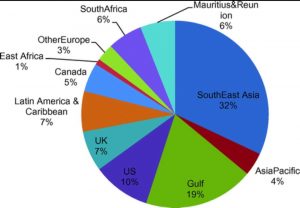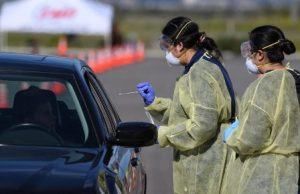Global Cooperation of Indian Diaspora during COVID-19
Connecting with Indian diaspora across the world will help in developing economic as well as socio-cultural ties with other countries.
 COVID-19 pandemic has exposed the entire humanity not only to an unprecedented health crisis, but also financial crisis. When international travel was suspended by India in March 2020, a lot of anxiety and uncertainty was created among Indians overseas, especially the ones on economic margins, students and blue-collar workers. The Global Research Forum on Diaspora and Transnationalism (GFRDT) organised a webinar “Indian Diaspora during COVID-19: Coping Strategies and Future Prospects” on 14 May 2020 keeping the role of Person of Indian Origin (PIO) diaspora amidst COVID-19 pandemic. The panelists from different host countries assessed the situations created by the pandemic and the role played by the Indian diaspora, especially PIO diaspora in dealing with the crisis as well as in determining the post COVID-19 world of mutual cooperation. The webinar was moderated by Prof. Chandrasekhar Bhat (Former Professor, Hyderabad Central University). Prof. Bhat highlighted two distinct streams of Indian diaspora – the Non-Resident Indian (NRI) diaspora and the PIO diaspora.
COVID-19 pandemic has exposed the entire humanity not only to an unprecedented health crisis, but also financial crisis. When international travel was suspended by India in March 2020, a lot of anxiety and uncertainty was created among Indians overseas, especially the ones on economic margins, students and blue-collar workers. The Global Research Forum on Diaspora and Transnationalism (GFRDT) organised a webinar “Indian Diaspora during COVID-19: Coping Strategies and Future Prospects” on 14 May 2020 keeping the role of Person of Indian Origin (PIO) diaspora amidst COVID-19 pandemic. The panelists from different host countries assessed the situations created by the pandemic and the role played by the Indian diaspora, especially PIO diaspora in dealing with the crisis as well as in determining the post COVID-19 world of mutual cooperation. The webinar was moderated by Prof. Chandrasekhar Bhat (Former Professor, Hyderabad Central University). Prof. Bhat highlighted two distinct streams of Indian diaspora – the Non-Resident Indian (NRI) diaspora and the PIO diaspora.
No Discrimination in Treatment in The Netherlands – PIO at Frontline
Prof Mohan K. Gautam, European University of West & East, The Netherlands, discussed the role of Indian diaspora and Indian embassy in the Netherlands in coping with COVID-19 crisis. Prof Gautam commented upon the reports that suggest more death of coloured people in the UK and USA and at the same time, clarified that in the Netherlands there is no such discrimination in the treatment of COVID-19 patients because of the involvement of Hindustanis in health care system of the country. Hindustanis are the PIO diaspora who had migrated to the Netherlands due to their particular reasons and now they have integrated into Dutch culture, politics, social welfare, health care and education system.
Hence, PIO are at frontline in the Netherlands, working continuously for the welfare of the citizens of the Netherlands irrespective of race, colour and religion.
Also Read : COVID 19 Opportunity to Improve Global and Regional Migration Governance
Another reason of lack of discrimination in treatment is medical insurance by the government in the Netherlands, which provides 900 Euro per month. Prof Gautam also suggested that Indian embassy should decide its credibility towards Indian diaspora in the Netherlands and Indians also need to create the political lobby of India there to help its diaspora during critical times similar to COVID-19.
PIO Stuck in St. Vincent
Arnold Thomas, Indian origin historian from St. Vincent, discussed the history of Indian diaspora in St. Vincent as well as how less population of PIO has affected Indian diaspora during COVID-19 in St. Vincent. Although, between 1861 and 1880, 2475 Indians were brought to St. Vincent and many of them were not inclined to go back, the deteriorating working conditions led Indians to protest against their exploitation, which triggered the end of indenture labor in St. Vincent. Once it was ended, half of the Indians were brought to St. Vincent returned back to India. In addition to the protest march, there were two other events also that affected Indian population in St. Vincent – the Hurricane of 1898 and volcanic eruption in 1902. By the time of World War II, many of the remaining Indians joined Windrush (it refers to the people who were invited by the governments to relocate to Britain from Commonwealth countries in the Caribbean to address labour shortage) and most of the Indian villages became depopulated. Therefore, today Indians are less than 10 per cent of total St. Vincent population, limited to 110 thousand in numbers. It might be because of less population that Indian diaspora in St. Vincent could not get any assistance from India during this COVID-19 crisis.
New Paradigms in Business and Health Care
Deo Gosine, an entrepreneur who temporarily shifted from New York to Trinidad after COVID-19 created a critical situation there, shared that the Government of Trinidad is handling the whole crisis more effectively than in New York or USA. In order to prevent the spread, the government had begun to act in time by closing the borders, suspending international travel and making mask compulsory at public places, etc. Along with the challenges, COVID-19 has also provided some opportunities as there would be new paradigms in business, communication and health care system in post-COVID-19 era. Deo Gosine suggested that now the academia and critics need to think how society will co-exist in post-COVID-19 period. Another panelist, Vishnu Bisram, a journalist in Guyana, also highlighted the opportunities that will be opened for India as well as its diaspora communities in the health care system. There are possibilities for India and USA to develop partnership in medical field in post-COVID-19 period. This partnership can have an impact on Indian diaspora in USA in many ways such as in relaxation of visa rules, new job opportunities, etc., along with strengthening economic status of both India and USA.
 Impact of Remittances from Fiji to India
Impact of Remittances from Fiji to India
Satish Rai, a filmmaker of Indian descent in Fiji, highlighted that COVID-19 has caused massive job loss for both NRI and PIO in Fiji/Australia. Earlier, the Girmitiyas (PIO) were more in number in Australia, but the large-scale student migration has increased the number of NRI diaspora in Australia. These NRI students are facing more problems during this pandemic crisis because most of them work part-time to bear their expenses, but this nation-wide lockdown has left these students with no source of income. Another problem, Satish Rai emphasised, was the loss of remittances from Fiji to India because it doesn’t come in the form of bank transfer, rather in the form of cash and investments whenever the Indo-Fijians would travel to India. As international travel has been suspended, it will create a huge impact on remittances.
Political Loss for PIO in Guyana
Vishnu Bisram, a journalist based in Guyana,observed thatthere is political loss for PIO in Guyana because of COVID-19. There were general elections in Guyana in March 2020 and the Indian descents were about to win elections, but stealing of ballets had caused delay in results. Now there is a need to recounting ballets in order to reach on final result, but due to COVID-19 it could not take place.
Overall, this pandemic has caused a political loss for PIO in Guyana. If the Indian descents had won, it would have improved the conditions of NRI–PIO in Guyana during COVID-19 crisis.
Also Read : COVID Does Not Discriminate An Unequal World Does
Additionally, there would be a huge impact on immigration to the West in post-COVID-19 world because of increased unemployment and travel restrictions. He pointed out that NRI-PIO will still have job opportunities, but the illegal migrants will have to face difficulties in getting employment both in homeland and host land.
GOPIO on Frontline against COVID-19 in France
Mehen Poinoosawmy, the international coordinator of Global Organization for People of Indian Origin (GOPIO), France, mentioned that GOPIO is working continuously to help the stranded Indians, especially students in France by providing them with ration bags with groceries. It is also collecting funds to distribute ration in Chennai and Delhi as well. Hence, GOPIO is working on frontline against COVID-19 not only in France, but also in their land of origin – India. At the same time, he also stated that different lockdown strategies of different European countries including Germany, France, UK, Italy, Spain, Sweden, Denmark and Norway had different impact on spread of COVID-19. Germany, which entered into lockdown early and isolated the people with symptoms of corona virus, by imposing strict restrictions, was able to reduce death rate. Therefore, proper sanitary measures and strict restrictions on movement can control the spread of corona virus.
Overall, all the panelists have suggested to strengthen the financial situation of the citizens; provide psychological support to people in diaspora; and create Indian lobbies to support NRI-PIO in dealing with this crisis. They have highlighted the opportunities in post-COVID-19 era to develop the economy as well as business ties with many developed countries. These business opportunities will be significant for India in post-COVID-19 world, as it needs to kick start the economic activities and connecting with Indian diaspora across the world will help in developing economic as well as socio-cultural ties with other countries.
